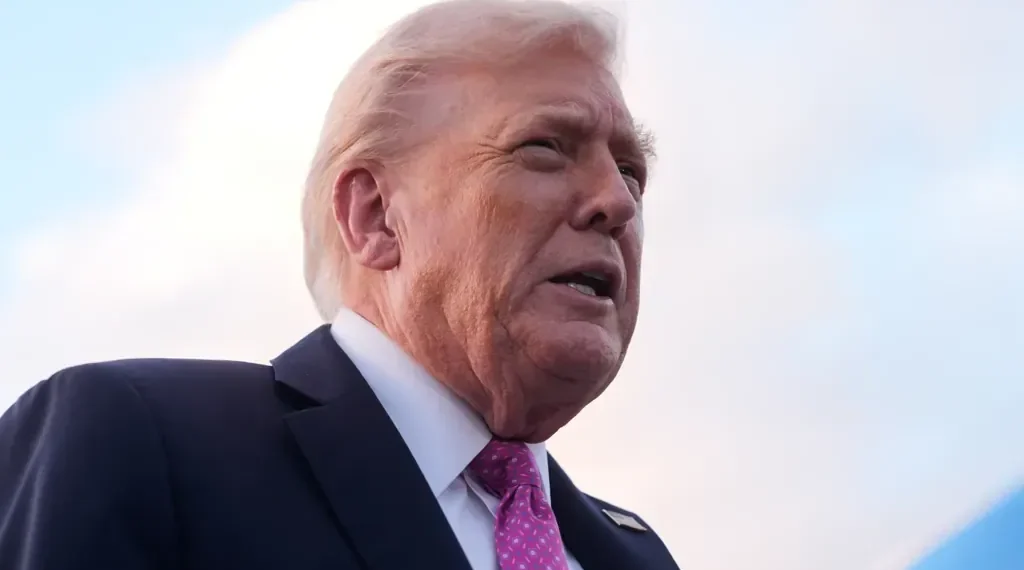Published: October 18, 2025, 22:10 EDT
President Donald Trump capped a politically charged week with a series of headline-making decisions — commuting former congressman George Santos’ prison sentence, urging Ukraine and Russia to halt their war “where they are,” and weighing new tariffs and foreign policy moves that signal shifting priorities in his second term. The flurry of announcements, made across several days of public appearances and social media posts, reflects Trump’s effort to reassert global influence while reshaping domestic alliances ahead of a challenging policy season.
Santos Granted Clemency After Fraud Conviction
In one of the most controversial acts of his presidency so far, Trump commuted the federal prison sentence of George Santos, the former Republican congressman from New York convicted of wire fraud and campaign finance violations. The White House announced the commutation on Friday evening, framing it as an act of “mercy and fairness” for a “talented individual who has paid his price.”
Santos, who had been serving a 30-month sentence, was released immediately following the order. Critics called the decision a clear case of political favoritism, while supporters argued it demonstrated Trump’s willingness to “correct judicial overreach.”
The move drew bipartisan criticism on Capitol Hill. Several Democratic lawmakers condemned it as “deeply troubling,” while some Republicans distanced themselves, warning that it could undermine public trust in accountability. White House spokespersons defended the commutation, citing Trump’s authority under the Constitution and referencing what they described as “selective prosecution” of political figures.
Calls for Ukraine and Russia to ‘Stop Where They Are’
Hours before signing the Santos order, Trump met with Ukrainian President Volodymyr Zelenskyy at the White House for a two-hour discussion on the future of the Ukraine war. Following the meeting, Trump urged both Kyiv and Moscow to end hostilities immediately and “stop where they are.”
“Enough blood has been shed,” Trump wrote on Truth Social. “Let both claim victory, let history decide.” He later elaborated to reporters in Florida, suggesting that peace could begin by freezing territorial lines along the existing front.
The statement followed a private phone call with Russian President Vladimir Putin, during which Trump reportedly discussed prospects for future peace talks in Budapest, Hungary. While Trump’s remarks drew criticism for potentially legitimizing Russian gains, his administration framed them as “pragmatic diplomacy aimed at ending human suffering.”
Zelenskyy, speaking after the meeting, said he agreed on the need for a ceasefire but avoided confirming whether Ukraine would accept such terms. “We have to stop where we are — and then to speak,” he said.
Missile Deal Reversal Highlights Growing U.S. Caution
During their talks, Zelenskyy proposed a technology exchange — offering Ukraine’s advanced drone systems in return for U.S. Tomahawk cruise missiles. Trump, however, appeared hesitant, saying he did not want to deplete U.S. stockpiles.
“I have an obligation to make sure that we’re completely stocked up as a country,” he said. “We’d much rather have them not need Tomahawks.”
The comments marked a reversal from earlier this month, when Trump signaled openness to the missile sale. The shift came after Putin warned that such transfers would “cause substantial damage” to U.S.-Russia relations.
Trump Considers New Tariffs and Energy Policy Adjustments
Beyond the diplomatic arena, Trump hinted at new economic measures aimed at reshaping U.S. trade relationships. During a business forum in Texas, he announced that his administration is reviewing tariffs on imported steel, electric vehicles, and renewable energy components — a move framed as protecting American industry.
“We’re rebuilding America’s manufacturing power,” Trump said. “We’re not going to rely on foreign supply chains that don’t have our interests at heart.”
Economists warn that higher tariffs could increase consumer costs and strain relations with key trading partners, especially within the European Union and Asia. However, administration officials argue the policy could strengthen domestic production and energy independence.
Tougher Stance on Venezuela and United Nations Funding
In foreign policy, Trump signaled a tougher approach toward Venezuela, criticizing President Nicolás Maduro’s government for “repression and economic mismanagement.” The administration is reportedly considering reimposing sanctions lifted earlier this year, pending new assessments by the State Department.
Trump also suggested reviewing U.S. contributions to United Nations programs, including peacekeeping operations, citing concerns over “financial accountability and effectiveness.” He said future U.S. participation would depend on reforms ensuring “results, not bureaucracy.”
A Strategic Week of Political Repositioning
Analysts see the week’s decisions as part of Trump’s broader strategy to project control amid challenges at home and abroad. His push for a Ukraine ceasefire, combined with a high-profile commutation and aggressive economic messaging, reflects both his unpredictability and his instinct for dominating global headlines.
“Trump is trying to consolidate his narrative of being the ultimate dealmaker — both domestically and internationally,” said Karen Hillman, a senior fellow at the Council on Foreign Relations. “Whether it’s clemency, diplomacy, or trade, every move is calculated to show he’s in command.”
Still, questions persist about the long-term implications. U.S. allies are closely monitoring the administration’s evolving position on Ukraine, while lawmakers continue to debate the ethical and political fallout from the Santos commutation.
For now, Trump appears undeterred. “I’ve been tested by the best,” he said when asked about global criticism. “And I’m still standing — stronger than ever.”
This article was rewritten by JournosNews.com based on verified reporting from trusted sources. The content has been independently reviewed, fact-checked, and edited for accuracy, neutrality, tone, and global readability in accordance with Google News and AdSense standards.
All opinions, quotes, or statements from contributors, experts, or sourced organizations do not necessarily reflect the views of JournosNews.com. JournosNews.com maintains full editorial independence from any external funders, sponsors, or organizations.
Stay informed with JournosNews.com — your trusted source for verified global reporting and in-depth analysis. Follow us on Google News, BlueSky, and X for real-time updates.














